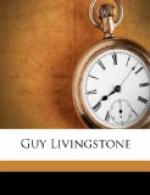“I believe it is precisely such regiments,” remarked Bruce, “that the political economists have in view when they attack the army estimates.”
The observation was aggressive; but Charley’s countenance was unruffled as the Dead Sea as he answered, “Personal, but correct. You are intimate with Joseph Hume, probably? You look as if you were.” (These last words were a stage aside, not quite so inaudible as could be wished.) “I think we should fight, if we had a chance, though.”
His lip wore a curious smile, and he raised himself on his arm to look the last speaker full in the face.
“Of course you would,” broke in Sir Henry; “that’s not a peculiarity of crack regiments or second sons. It’s only in their baptism of fire that the young ones shrink and start; after that, the meekest of men develop themselves wonderfully. I heard an old Indian, the other day, speak of a case in point.
“There was an officer in his service, mild and stupid to a degree. He had been a butt all his life; bullied at school, at Addiscombe, and in his corps worst of all.
“They were attacking a hill-fort, and the fire from wall-pieces and matchlocks was so heavy that the storming-party would not face it. Among those who retreated were two of his superior officers and chief tormentors. The junior lieutenant saw them cowering away to seek shelter, and laughed out loud; then he flung his shako before him into the fort, and led the sepoys back to the charge, and right over the breastwork—bareheaded and cheering. He was shot down inside, and lived only a few hours, all the time in horrible agony; but Western told us that Bayard or Sidney could have made no braver or calmer ending.”
“You are right,” Livingstone said. “The Roundheads fought fully as well as the Cavaliers. I only know of two instances where the thoroughbreds had the advantage of a contrast. One was when the Scottish regiment took the island in the Rhine; the other was the exploit of the Gants Glaces. Don’t you know it? It’s worth hearing.
“They were attacking some town in the wars of the Fronde. The breach was scarcely practicable, and the best of the besieging army had recoiled from it with great loss. The Black Mousquetaires stood by in all the coquetry of scarf, and plume, and fringed scented gloves, laughing louder at each repulse of the Linesmen. The soldiers heard them and gnashed their teeth. At last there was a murmur, and then a shout—’En avant les Gants Glaces!’ They wanted to see ‘the swells’ beaten too. Then the Household Brigade went up and carried the breach, leaving a third of their number on it. The general in command made the whole army defile past their guidon, and salute it with sloped standards.
“No; very few men are physical cowards in battle, whatever they may be across country. I don’t believe Paris was, when he ran from Menelaues; and Helen did not think so, though she teased him about it, or she would never have spoken to him again. I rather imagine his feeling was that of a certain Guardsman of our acquaintance, who said, declining the ordeal of combat, that ’his first duty was to his partners, and this did not allow him to risk a black eye.’”




